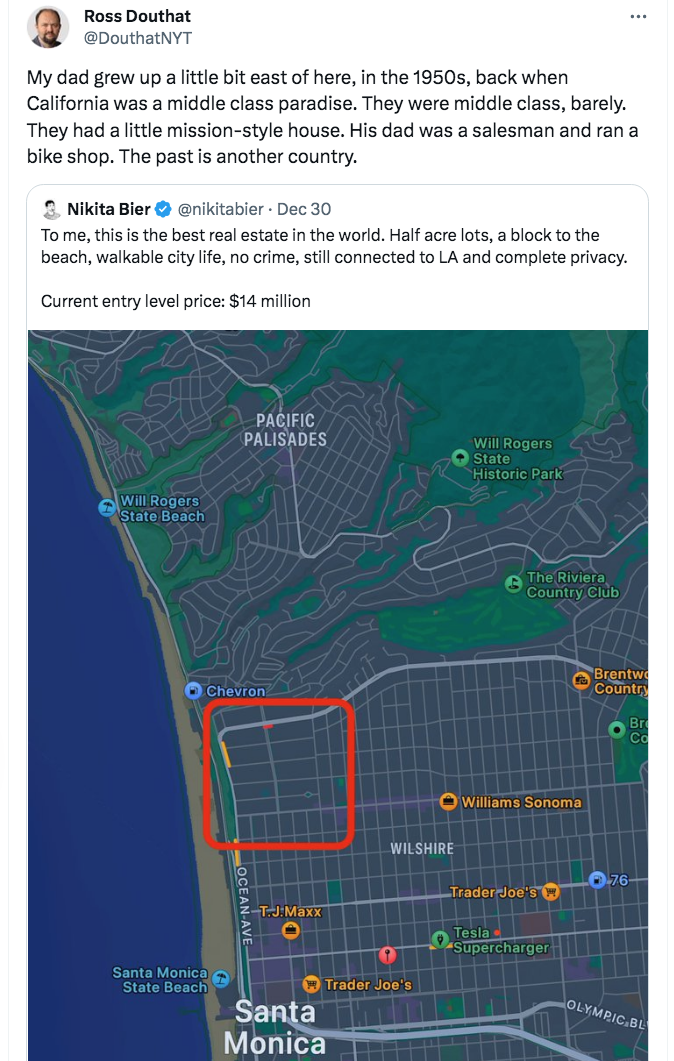[ad_1]
Nostalgia is a heckuva drug. (I know, I am one of those suffering from the addiction.) But we should never confuse dreams and reality. This tweet caught my eye:
 I suppose you could argue that 1950s California was a middle class paradise. If so, that’s even more true today. Back when I was born, Orange County had about 400,000 people, mostly living in small ranch houses and bungalows. Today it has over 3.1 million, most of whom live in homes built after 1955. These newer homes are typically much larger and more lavishly furnished than the homes of our grandparents. The residents drive far better cars, which are much less polluting. They have access to technology our ancestors couldn’t even imagine. So yeah, we are far better off in material terms and there are far more of us. Are we any happier? Who’s to say?
I suppose you could argue that 1950s California was a middle class paradise. If so, that’s even more true today. Back when I was born, Orange County had about 400,000 people, mostly living in small ranch houses and bungalows. Today it has over 3.1 million, most of whom live in homes built after 1955. These newer homes are typically much larger and more lavishly furnished than the homes of our grandparents. The residents drive far better cars, which are much less polluting. They have access to technology our ancestors couldn’t even imagine. So yeah, we are far better off in material terms and there are far more of us. Are we any happier? Who’s to say?
It’s often said that average people can no longer afford to live in California, in which case it must be true that California contains 39 million very above average Americans.
Those who wish to argue that we are worse off than back in 1955 often point to highly unrepresentative examples. They don’t show towns in Appalachia or the Deep South full of shacks lacking indoor plumbing and electricity. Instead, they find an unrepresentative upper middle class area that has recently become super trendy, and hence unaffordable for the class of people that formerly lived in that area. Such as northwestern Santa Monica.
When I began graduate work at the University of Chicago, my professor (Deirdre McCloskey) began the semester with a long list of forbidden words. I don’t recall the entire list, but do recall that “afford” was one of the forbidden words. This term is so vague as to be almost useless.
When thinking about living standards, don’t think about what you believe people can or cannot “afford”, think about what people actually consume. And in purely material terms, we consume far more than we did back in 1955.
Now you might argue that we work harder for that consumption than we did back in the 1950s, but I don’t believe that’s true. The truly difficult jobs (like underground coal mining) are mostly gone. Many office workers now spend part of their day surfing the web, doing online shopping.
California does have a housing problem, but it’s a problem of success, not failure. Although we have 39 million people, the state is so desirable that far more people would choose to live here if the housing stock were larger. I’d rather have this problem than the problems faced by cities such as Detroit (lots of empty houses that no one wishes to inhabit.) We need to loosen our zoning laws so that millions more people can enjoy what Ross Douthat calls the California middle class paradise.
PS. I can go back to my hometown (Madison) and morn the loss of a certain way of living, such as “free range kids”. But that nostalgia for the past tells us precisely nothing about how the economy has changed over the past 60 years. In purely material terms, Madison is much richer than before, even though if my dad were still alive he could no longer “afford” the house we once lived in, partly because a subsequent addition has doubled its size from 2000 sq. feet to 4000 sq. feet.
Many houses in coastal areas of California have been extensively upgraded, and are no longer the same house that they were back in 1955.
[ad_2]
Source link




















